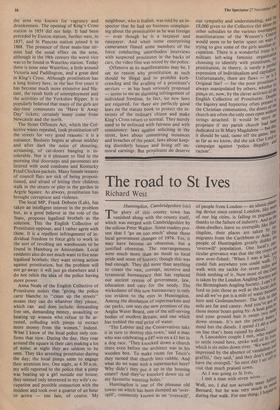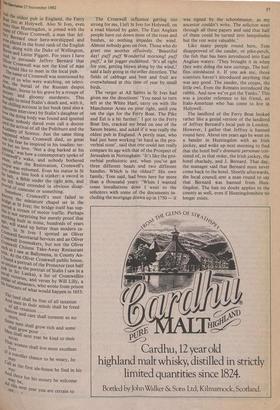The road to St Ives
Richard West
Huntingdon, Cambridgeshire (sic) The glory of this county town has vanished along with the county itself, which was merged with Cambridgeshire by the odious Peter Walker. Some readers pro- test that I `go on too much' about those local government changes of 1974. Yes, it may have become an obsession, but a justified obsession. The rearrangements were much more than an insult to local pride and sense of history; though this was bad enough. They did more than anything to create the vast, corrupt, secretive and tyrannical bureaucracy that has replaced our ancient system of government, law, education and care for the needy. The wickedness of this new bureaucracy is only too evident to the eyes in Huntingdon. Among the desolation of supermarkets and car parks, one sees the new premises of the Anglia Water Board, one of the self-serving bodies of modern Britain, and one which has trebled the real price of water.
`The Labour and the Conservatives take it in turn to destroy this town,' said a man who was celebrating a £47 win on a £1 bet in a dog race. 'They knocked down a church there even before the architect was in his wooden box. To make room for Tesco's they turned that church into rubble. And what do we want with a supermarket here? Why didn't they put it up in the housing estate? And they've knocked down six of my favourite watering holes.'
Huntingdon is one of the pleasant old towns on which has been dumped an 'over- spill', commonly known as an `overswill',
o. f people from London — an idiotic Plaillis; ing device since central London, like 111.°0 of our big cities, is falling in poPulat,1°the' thanks to the failure of industry. And a„; ry slum-dwellers leave to overspills like tingdon, their places are taken by Themigrants from the Caribbean or Asia. people of Huntingdon greatly dislike `overswill' population. One local's pat. are ticular grievance was that the the rivers on now over-fished: 'When I was a lad, Yis;o could fish anywhere you could walk' and walk with my tackle for seven miles,,se sh think taken b y the oLfo int d. oNno Angling nmg loi ns most of the `- d oS eieiY,3;(- the Birmingham Angling Society. I can t. 17, ford to join those as well as the local olio and all we've got is a mile of water betwelot here and Godmanchester. The fish in ,t all mile are fat and canny. And You've g°' those motor boats going by. A boat goesiiis and your ground bait is swept two 111,1 I down stream. It's not the petrol boalecl, mind but the diesels. I spend £1.60 a w on line that's been ruined by diesel.' ted A Lancashire couple I met, who waill45, to settle round here, spoke well of St Ives w. hich is six miles down river. ewe Were • 4d impressed by the absence of vandalisin and graffiti,' they said,' and they don't seerriff to have the overspill.' So next day I set °. visit that much praised town.
As I was going to St Ives,
I met a man with seven wives. • frey Well, no, I did not actually meet /ef mind Bernard, but he was very much in ed 10 during that walk. For one thing, I hop visit the oldest pub in England, the Ferry Boat Inn at Holywell. Also St Ives, even more than Huntingdon, is joined with the rnahle of Oliver Cromwell, a man that Jef- 'etY Bernard once hero-worshipped and even Placed in the front rank of the English troreat, along with the Duke of Wellington, ;',Yron and Lester Piggott. For years I have (14Td to persuade Jeffrey Bernard that n'I'ver Cromwell was not the kind of man -11,e would like to meet in the local pub. „the name of Cromwell was mentioned by Ttne of us who were watching, on televi- sion' the burial of the Russian despot tnrezhnev, borne to his grave by a troupe of cient and gloomy murderers. This that to mind Stalin's death and, with it, at chilling account in her book (and also a chin interview) by Stalin's daughter of bow the dying body was found and ignored anti nobody dared even call a doctor A"caciu the arrival of all the Politburo and the h;ertlY of Science. Just the same thing ,.'l)Pened when Cromwell died, so great rwas the fear he inspired in his toadies: ter.- °I. but no love. 'Not a dog barked at his cPassing,' was how a contemporary spoke of whrurnwell's wake, and nobody bothered en e after the Restoration, Cromwell's Ives was exhumed. Even his statue in St his Makes him look a stinker: a sword in the belt, a Bible under the right arm, and pre left hand extended in obvious disap- °val of someone or something. ,i_S°tnehovv, Cromwell's men failed to -brcs. troy
me miniature chapel set in the
ported a St Ives; the bridge itself has sup- ovrted a stream of motor traffic. Perhaps an's is not surprising but merely proof that bnYllling built in stone, hundreds of years meet will stand up better than modern ce- ernt In St Ives I spotted an Oliver crcInWell Secretarial Services and an Oliver croethwell Ironmakers, but not the Oliver such rnwell Chinese Take-Away Restaurant
trjol I saw at Ballymena, in County An-
fo At the Oliver Cromwell public house, so jincl a portrait of the Protector (not half pulnister as the portrait of Stalin I saw in a 44,.° in Sri Lanka), a list of Cromwellite 0441 victories, and verses by Will Lilly, a his forecasts of almanacs, who wrote from prison
lorecasts of what would happen in 1653: The
nd land shall be free of all taxation Men in their minds shall be freed vexation
-urroowll and care shall torment us no rnre,
-le" men shall grow rich and some Nish grow poor Me shall next year be kind to their Wives ihates „ women shall live most excellent
'Iv • ..
If a traveller chance to be weary, he may Call at the first ale-house he find in his And there for his money he welcome ay be Allrn this next year you are certain to See. The Cromwell influence getting too strong for me, I left St Ives for Holywell, on a road blasted by gales. The East Anglian people have cut down most of the trees and bushes, so nothing impedes the wind. Almost nobody goes on foot. Those who do greet one another effusively. 'Beautiful day! puff puff Wonderful morning! puff puff,' a fat jogger exclaimed. 'It's all right for you, getting blown along by the wind,' said a lady going in the other direction. The fields of cabbage and beet and fruit are overwhelmed at this time of year by small birds.
The verger at All Saints in St Ives had given me the directions: 'You need to turn left at the White Hart, carry on with the Manchester Arms on your right, until you see the sign for the Ferry Boat. The Pike and Eel is a bit farther.' I got to the Ferry Boat Inn, cracked my head on one of the Saxon beams, and asked if it was really the oldest pub in England. A portly man, who had just been working 'as hard as the pro- verbial stoat', said that one could not really compare its age with that of the Prospect of Jerusalem in Nottingham: 'It's like the pro- verbial prehistoric axe, when you've got three different heads and two different handles. Which is the oldest?' His own family, Tom said, had been here for more than a thousand years: 'When I wanted some installations done I went to the solicitors with some of the documents in- cluding the mortgage drawn up in 1750 — it was signed by the schoolmaster, as my ancestor couldn't write. The solicitor went through all these papers and said that half of them could be turned into lampshades but the rest were valuable.'
Like many people round here, Tom disapproved of the zander, or pike-perch, the fish that has been introduced into East Anglian waters: 'They brought it in when they were doing the new cuttings. The bof- fins introduced it. If you ask me, those scientists haven't introduced anything that was any good. The zander, the coypu, the little owl. Even the Romans introduced the rabbit. And now we've got the Yanks.' This was a jocular reference to his friend, an Italo-American who has come to live in Holywell.
The landlord of the Ferry Boat looked rather like a genial version of the landlord of Jeffrey Bernard's local pub in London. However, I gather that Jeffrey is banned round here. About ten years ago he went on a bender in Huntingdon with an Irish jockey, and woke up next morning to find that the hotel bed's dramatis personae con- sisted of, in that order, the Irish jockey, the hotel charlady, and J. Bernard. That day, the manager said that Bernard must never come back to the hotel. Shortly afterwards, the local council sent a man round to say that Bernard was banned from Hun- tingdon. The ban no doubt applies to the county as well, even if Huntingdonshire no longer exists.











































 Previous page
Previous page